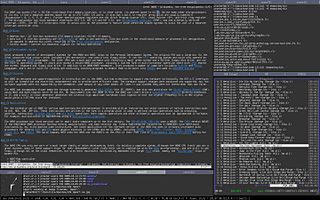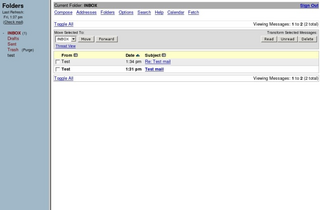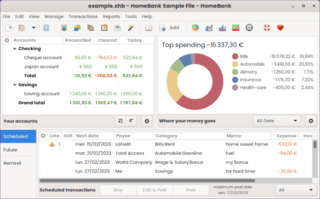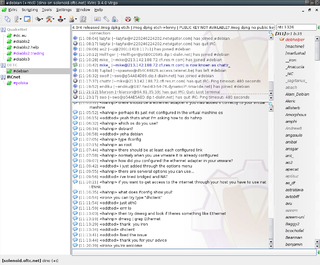
Irssi is an IRC client program for Linux, FreeBSD, macOS and Microsoft Windows. It was originally written by Timo Sirainen, and released under the terms of the GNU GPL-2.0-or-later in January 1999.

In Unix computing, Ion is a tiling and tabbing window manager for the X Window System. It is designed such that it is possible to manage windows using only a keyboard, without needing a mouse. It is the successor of PWM and is written by the same author, Tuomo Valkonen. Since the first release of Ion in the summer 2000, similar alternative window management ideas have begun to show in other new window managers: Larswm, ratpoison, StumpWM, wmii, xmonad and dwm.

Free and Open source Software Developers' European Meeting (FOSDEM) is a non-commercial, volunteer-organized European event centered on free and open-source software development. It is aimed at developers and anyone interested in the free and open-source software movement. It aims to enable developers to meet and to promote the awareness and use of free and open-source software.
phpLDAPadmin is a web app for administering Lightweight Directory Access Protocol (LDAP) servers. It's written in the PHP programming language, and is licensed under the GNU General Public License. The application is available in 14 languages and supports UTF-8 encoded directory strings.

SquirrelMail is a project that aims to provide both a web-based email client and a proxy server for the IMAP protocol.
Technical variations of Linux distributions include support for different hardware devices and systems or software package configurations. Organizational differences may be motivated by historical reasons. Other criteria include security, including how quickly security upgrades are available; ease of package management; and number of packages available.

The GNU Data Language (GDL) is a free alternative to IDL, achieving full compatibility with IDL 7 and partial compatibility with IDL 8. Together with its library routines, GDL is developed to serve as a tool for data analysis and visualization in such disciplines as astronomy, geosciences, and medical imaging. GDL is licensed under the GPL. Other open-source numerical data analysis tools similar to GDL include Julia, Jupyter Notebook, GNU Octave, NCAR Command Language (NCL), Perl Data Language (PDL), R, Scilab, SciPy, and Yorick.
The following tables compare general and technical information between a number of notable IRC client programs which have been discussed in independent, reliable prior published sources.

virt-manager is a desktop virtual machine monitor primarily developed by Red Hat.

PulseAudio is a network-capable sound server program distributed via the freedesktop.org project. It runs mainly on Linux, various BSD distributions such as FreeBSD and OpenBSD, macOS, as well as Illumos distributions and the Solaris operating system. It serves as a middleware in between applications and hardware and handles raw PCM audio streams.

Mondo Rescue is free disaster recovery software. It supports Linux and FreeBSD (i386). It's packaged for multiple distributions. It also supports tapes, disks, USB devices, network and CD/DVD as backup media, multiple filesystems, LVM, software and hardware RAID. Restoration may be done from a physical media including OBDR tape support, or CD/DVD/USB media, or from the network through PXE.

HomeBank is a personal accounting software package that runs on OpenBSD, Linux, FreeBSD, Microsoft Windows, macOS and AmigaOS. Released under version 2 or later of the GNU General Public License, HomeBank is free software. HomeBank can be found in the software repositories of Linux distributions such as Debian, Fedora, Mandriva, openSUSE, Gentoo Linux, Arch Linux and Ubuntu.

Smuxi is a cross-platform IRC client for the GNOME desktop inspired by Irssi. It pioneered the concept of separating the frontend client from the backend engine which manages connections to IRC servers inside a single graphical application.

Linux-libre is a modified version of the Linux kernel that contains no binary blobs, obfuscated code, or code released under proprietary licenses. In the Linux kernel, they are mostly used for proprietary firmware images. While generally redistributable, binary blobs do not give the user the freedom to audit, modify, or, consequently, redistribute their modified versions. The GNU Project keeps Linux-libre in synchronization with the mainline Linux kernel.

awesome is a dynamic window manager for the X Window System developed in the C and Lua programming languages. Lua is also used for configuring and extending the window manager. Its development began as a fork of dwm. It aims to be extremely small and fast, yet extensively customizable. It makes it possible for the user to manage windows with the use of keyboard.

KVIrc is a graphical IRC client for Linux, Unix, Mac OS and Windows. The name is an acronym of K Visual IRC in which the K stands for a dependency to KDE, which became optional from version 2.0.0. The software is based on the Qt framework and its code is released under a modified GNU General Public License.
Dracut is a set of tools that provide enhanced functionality for automating the Linux boot process. The tool named dracut is used to create a Linux boot image (initramfs) by copying tools and files from an installed system and combining it with the Dracut framework, which is usually found in /usr/lib/dracut/modules.d.

Zathura is a free, plugin-based document viewer. Plugins are available for PDF, PostScript and DjVu. It was written to be lightweight and controlled with vi-like keybindings. Zathura's customizability makes it well-liked by many Linux users.















